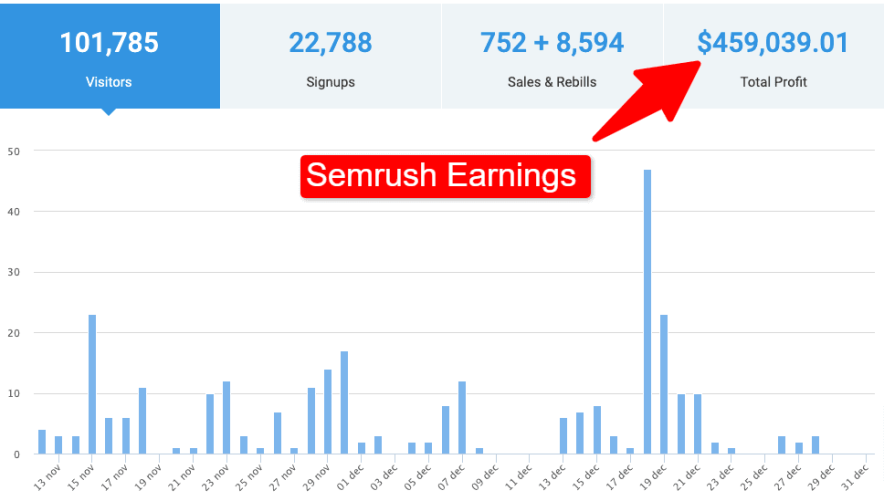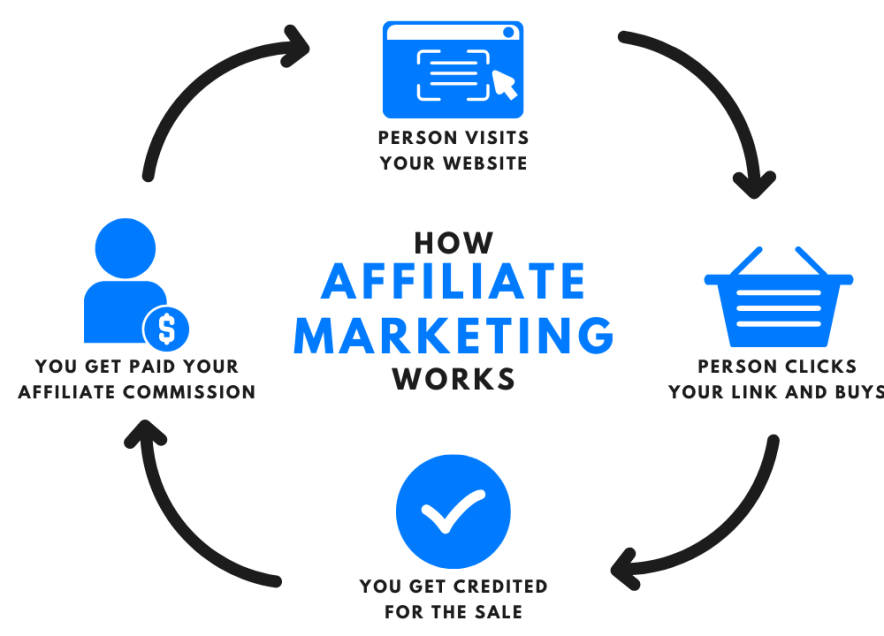One of the common questions most people often ask is: “Is affiliate marketing legit?”
Short answer: Yes, affiliate marketing is legitimate.
The blog you’re currently reading generated over 1,000,000 dollars in the last six years years.
Here’s one of our affiliate earning reports;


Last year, i.e. 2023, we made over $160,000 (average monthly earnings: $13,300). You can check out our blog’s income reports for a detailed earnings breakdown.
The best part? Most of that revenue came from affiliate marketing.
We’re also one of the top affiliates for SEO products like Semrush affiliate.
Basically, affiliate marketing allows you to promote others’ products where you make money whenever someone purchases something using your links.
In this post, we’ll discuss some of the crazy affiliate marketing myths you need to know and tips to avoid scams in affiliate marketing. Are you ready? Let’s jump into the details.
What exactly is affiliate marketing, and how does it work?
Affiliate marketing is a legitimate business model where affiliates promote a business’s products or services. You get a commission whenever someone clicks your link and buys the product.
Affiliates can be anyone, including bloggers, YouTubers, social media influencers, entrepreneurs, etc. Many people don’t know how affiliate marketing works, so let’s briefly discuss it.


Here’s a simple breakdown of how it works:
- The Company: A company like Semrush wants to attract more new customers, so they create an affiliate program. They give you a unique link for their affiliate program.
- The Affiliate (you!): You join their affiliate program for free (most affiliate programs are 100% free to join). Once your account gets approved, you get a unique link that you can share with your followers or audience (on your blog, social media, etc.).
- The Customer: Your followers see your recommendation, click your link, and buy the product.
- The Commission: The company (in our example, Semrush) knows your follower came from your link and gives you a commission (like a percentage of the sale).
Companies (such as Semrush) get MORE customers, affiliates (like YOU) get a commission, and your customers (such as followers or visitors) get access to a fantastic product. It’s a win/win approach. So, yes, affiliate marketing is the legitimate way to earn passive income online.
4 Common Misconceptions about Affiliate Marketing


Some people have misconceptions about affiliate marketing, leading them to believe it’s a scam. Here are four common myths about affiliate marketing.
1. Traffic is money
While it’s true that traffic is one of the KEY factors that determines the success of your affiliate marketing journey, it’s NOT the only thing.
Why? Every visitor is NOT going to convert into a sale. You need highly targeted visitors to your site.
It’s better to build a website that gets 100 highly relevant people than a website getting 10,000 irrelevant visitors who are not interested in what you sell.
Try to learn and implement SEO tactics like proper keyword research, link building, creating helpful content, etc. That’s how you attract TARGETED visitors to your site from search engines like Google.
2. Your affiliate commissions depend on your LUCK
There’s NO luck involved in any serious business, including affiliate marketing.
You must work hard, be consistent and offer lots of value to your audience. That’s how you build a successful affiliate website.
More than luck, it’s your SKILLS that matter. Also, there are a ton of affiliate marketers, such as Pat Flynn, who make a living from selling affiliate products.
You’ll generate MORE affiliate sales if you’re good at persuading people to take action (such as free trials, subscribing, purchasing, etc.). It’s as simple as that.
Try to use persuasive copy, including headlines, introductions, call-to-action text, etc., to generate better conversions.
3. Affiliate marketing is dead
No, affiliate marketing is NOT dead.
Do you know why? It is a growing market, and the future of affiliate marketing is excellent.
The affiliate marketing industry is expected to reach $15.7 billion by the end of 2024 and will reach over $39 billion by 2031 (Source: Astute Analytica)


You can check out these latest affiliate marketing statistics for more details.
However, remember that affiliate marketing is NOT a get-rich-quick scheme. It takes lots of time to see decent results (at least 1 or 2 years). That’s why most people say it’s dead.
4. All industries are competitive
While it’s true that most of the industries are extremely competitive.
But, you can still find a small market and dominate it to succeed as an affiliate marketer.
For example, the fitness industry is HUGE. You really can’t compete with top fitness websites like Nerd Fitness.
However, you can pick a small segment in the fitness industry, such as weight loss for diabetes, nutrition advice for pregnant women, weight training and exercise guides, etc., to create your expertise.
3 Affiliate Marketing Scams to Avoid At All Costs
Although affiliate marketing is a legitimate way to earn money online, countless scammers try to exploit the system through fraudulent practices.
Want to protect yourself from affiliate fraud? Here are THREE common affiliate marketing scams you must avoid in 2024.
1. Pay-to-join affiliate programs
Suppose anyone asks you to pay to join an affiliate program or scheme – RUN! It’s 100% a scam.
These pay-to-join programs lure you in with crazy promises of HEFTY commissions, but all they do is take your money and run.
Legitimate affiliate programs are free to join. Amazon, eBay, ShareASale, ClickBank – none of these top affiliate networks ask for an upfront fee to join their affiliate programs.
Here’s a simple breakdown;
- Legit Affiliate Programs: You find and join an affiliate program to promote a company’s product. If someone buys it through your link, you earn a commission.
- Pay-to-join Scams: You pay money upfront to “join” an affiliate program, but you’ll never get access to any product to promote.
So, if you ever see someone asking for an upfront fee to join a program, avoid it!
2. Fake courses from “so-called gurus”
The Internet is full of fake gurus.
Here’s how to spot a fake guru: they promise you’ll earn thousands of dollars overnight (if you try their paid courses).
They will NEVER reveal their income reports or case studies. They also often flash fancy cars, but their courses contain rehashed content you can find for free online.
If you really want to invest in affiliate marketing courses, buy from people already making a full-time income selling affiliate products. They guide you, answer your questions, and help you improve.
Do your research before buying any course. Make sure to find MORE information about the person selling those products.
3. Multilevel Marketing and Pyramid Schemes
Multilevel Marketing (MLM) and pyramid schemes are the most common types of scams in affiliate marketing.


In these systems, you’re not just promoting products; you’re recruiting others to do the same.
You’ll earn money by recruiting people under you, not by selling products to actual customers. It’s a scam. Why? In legitimate affiliate marketing, you’ll NEVER recruit people; you’ll promote products. So, avoid falling into MLM scams online.
Above all, if someone promises you easy money with little effort, it’s probably too good to be true. Avoid such scams.
Apart from these three affiliate marketing scams, there are countless ways people try to scam you. Remember one thing: if someone asks you for money upfront or promises “unbelievable earnings”, avoid such programs.
If you’re looking for a consistent income from affiliate marketing, we recommend you check out these recurring affiliate programs instead. These programs pay you commissions as long as your referrals make payments, such as subscriptions or memberships.
How to Get Started as a Beginner: A Quick Checklist
So, still reading? Ready to launch your affiliate journey? Here’s a quick checklist on how to get started with affiliate marketing as a beginner.
- Pick ONE medium. It can be a blog, YouTube channel, podcast, or social media platform. Why? You need an audience who’s interested in the products you’re going to recommend. Yes, you can start your affiliate marketing journey without a blog or YouTube channel, but it’s hard to survive without a solid medium.
- Select a niche. It can be anything from fitness to real estate to marketing. Make sure to narrow it down, as there’s a huge competition in every industry. Choose a niche where customers already need your products or services.
- Sign up for an affiliate program. Use affiliate platforms like CJ, Amazon, ShareASale, etc., to find relevant products in that niche. Don’t sign up for ANY program that says you “pay to join”; such kinds of programs are MOSTLY scams.
- Create awareness about the products you want to promote. You can create blog posts, social media posts, email newsletters, video tutorials, etc. Use your affiliate links in between.
- Add as much value as you can. The more people trust what you’ve to say, the more sales you can generate. It’s as simple as that. Build an email list, create in-depth reviews of the products, provide free trials, etc.
- Rinse and repeat. Remember, it takes time to build a successful affiliate marketing business. It took us 5+ years to generate decent sales from affiliate marketing. You can read our blogging journey to find more details.
FAQs | Is Affiliate Marketing Real?
So far, we’ve covered everything you need to know about “Is affiliate marketing legit?”. Here are some of the commonly asked questions on affiliate marketing.
What things should I be aware of to avoid affiliate marketing scams?
Here are a few things you should consider before promoting any affiliate product.
– Get-rich-quick schemes. If any affiliate program promises unrealistic commissions to make money overnight, avoid it.
– Spammy tactics. Avoid any program that gives you misleading information to promote.
– Fake products. Make sure to research the brand to see how legitimate it is.
Can I really make money with affiliate marketing?
Yes, there are a ton of people who make upwards of $100K every single year from affiliate marketing. The blog you’re reading generates over $13K per month (mostly from affiliate products).
Where do I find reputable affiliate programs?
Almost all the MAJOR businesses run their own affiliate programs, such as Semrush, Bluehost, GetResponse, etc. You can also find tons of relevant products through affiliate networks like CJ Affiliate, Awin, Rakuten Marketing, ShareASale, etc.
What are the tips for becoming a successful affiliate marketer?
Here are some of the best tips that work in 2024;
– Choose products you genuinely find VALUE
– Build a targeted audience who is interested in the products you promote
– Create high-quality content that creates awareness about your products
What are the risks involved in affiliate marketing?
Some of the risks include;
– Low success rate, as most affiliate marketing beginners NEVER generate even $100. It can take time to build a thriving affiliate business.
– Heavy competition in almost every industry.
– No control, as the affiliate marketing developer has ALL the rights to terminate your account (if they find any unethical practices).
Read More:
Final thoughts on affiliate marketing reviews
Hands down, affiliate marketing can be an excellent way to earn passive income online, but it’s NOT a get-rich-quick scheme.
You should research the products you promote. Read customer reviews. Promote only those products that you find helpful to your target audience.
So, what do you think about affiliate marketing? Have any questions? Let us know in the comments.




